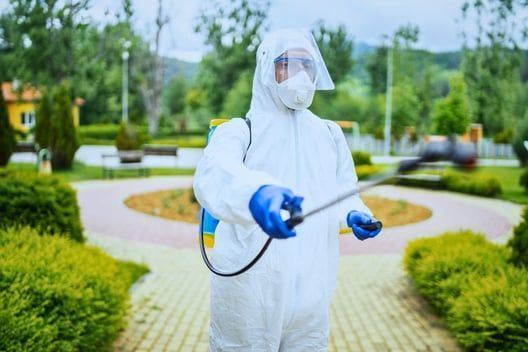How to Prepare Your Home for Seasonal Pest Issues

As the seasons change, so do the pests that invade our homes. Each season brings different challenges and pest problems, from ants and cockroaches in the summer to rodents and termites in the winter. The good news is, with a little preparation, you can keep your home safe from these unwanted guests. In this post, we’ll walk you through the most effective steps you can take to prepare your home for seasonal pest issues. By the time you’re done reading, you’ll be equipped with the knowledge to make sure pests stay outside, where they belong.
Seal Up Entry Points
The first step in preparing your home for seasonal pest issues is to secure any potential entry points. Pests, whether ants, rodents, or even termites, are experts at finding the smallest openings to sneak inside. Start by checking around your windows and doors for gaps or cracks that can easily be sealed with weatherstripping or caulk. Don’t forget to inspect the foundation and roofline of your home—termites and rodents often enter through these less obvious areas. You may also want to check around pipes and vents, as these are common entry points for pests like ants and mice.
Sealing these entry points not only keeps pests out but also improves the overall energy efficiency of your home. Proper sealing ensures that your heating or cooling system doesn’t have to work harder to maintain a comfortable temperature. Take a walk around your property with a keen eye and look for anything that could allow pests to gain entry. Doing so before the season changes can save you time and frustration down the road, as preventing pests from entering in the first place is always easier than dealing with an infestation.
Maintain Your Yard
Your yard plays a big role in determining whether pests find their way into your home. If you’re not careful, overgrown shrubs, tall grass, and piles of leaves can become the perfect hiding places for pests like rodents and insects. Keep your lawn trimmed and your shrubs well-maintained. Make sure to rake leaves regularly, especially in the fall, and remove any debris that could attract pests looking for shelter. If you have firewood, store it away from your home and elevate it off the ground to prevent termites and other pests from moving in.
Properly maintaining your yard also means addressing any standing water sources. Mosquitoes thrive in stagnant water, so check for water pooling in gutters, birdbaths, or even in your potted plants. By maintaining a tidy yard and keeping standing water to a minimum, you make your home less inviting to pests. Not only will this protect your home from potential infestations, but it will also keep your yard looking neat and welcoming for the season ahead.
Clear Out Clutter
Clutter is an ideal hiding place for pests, especially during the colder months when they’re looking for a place to escape the elements. Start by decluttering areas like your garage, attic, and basement. Piles of cardboard boxes, old furniture, and other unused items create cozy little nests for pests to hide in. Make sure to store seasonal items in sealed plastic containers, which pests will have a harder time accessing. If you have food in these areas, be sure it’s sealed tightly to avoid attracting rodents and insects.
In addition to clearing out indoor clutter, consider organizing your outdoor storage areas as well. Keep tools and gardening supplies in sealed containers or sheds to avoid providing easy access to pests. By keeping your storage areas neat and organized, you reduce the number of places where pests can nest and make your home less attractive to them. A clutter-free home is not only more inviting to you and your family but also less inviting to the pests trying to make themselves at home.
Check for Moisture Problems
Excess moisture is one of the biggest contributors to pest problems, as many pests, including termites, ants, and rodents, are drawn to damp environments. Inspect your home for leaks, particularly in areas like the kitchen, bathroom, and basement. Check pipes, faucets, and under sinks for signs of water damage, as these can be ideal entry points for pests. If you find any leaks, have them repaired promptly to prevent moisture from accumulating. You should also consider installing dehumidifiers in damp areas to reduce the humidity levels that pests find attractive.
If you have a crawl space or basement, make sure it’s properly ventilated and free of standing water. A sump pump can be a useful tool for keeping your basement dry, especially during the rainy season. Moisture control is key to making sure pests, like termites and cockroaches, don’t take up residence in your home. Addressing moisture issues will not only protect your home from pests but also prevent the growth of mold and mildew, which can cause other health problems.
Regularly Inspect Your Home
One of the most proactive steps you can take in preventing seasonal pest issues is to conduct regular inspections of your home. Inspect areas like the attic, basement, and garage for signs of pests, including droppings, chewed wires, or nests. Checking for early warning signs allows you to catch infestations before they grow too large. Be sure to also check common areas like kitchens and bathrooms where pests are more likely to be drawn to food and moisture. If you find any signs of pests, it’s best to address the issue as soon as possible before it becomes a bigger problem.
Regular inspections should also include a look at the exterior of your home. Examine your gutters to ensure they’re free of debris and water can flow freely, which helps prevent pests from making nests in them. If you notice anything unusual, such as holes in the walls, droppings, or signs of damage, it’s important to address the issue immediately. By being vigilant and checking your home regularly, you’ll be able to catch potential pest issues before they turn into full-blown infestations.
Proper Waste Management
Pests are attracted to food, so one of the easiest ways to keep them out of your home is to ensure that your trash is properly managed. Make sure to store your garbage in sealed bins, and take the trash out regularly to prevent attracting pests like ants, rodents, and cockroaches. Keep compost piles far from your home, and make sure they are contained and covered to avoid providing a food source for pests. If you store your trash bins outside, make sure they are tightly sealed and consider placing them on a hard surface to make it more difficult for pests to get inside.
Inside the home, make sure to clean up crumbs and spills as soon as possible, especially in the kitchen. Don’t leave food uncovered overnight, and be sure to store food in airtight containers. A clean kitchen is one of the best deterrents to pests, as it eliminates the food sources they rely on. Taking these simple steps to manage waste properly will help keep pests at bay throughout the changing seasons.
Address Rodent Issues Early
As the weather cools, rodents like rats and mice seek shelter in warm homes, making it important to address any potential rodent problems before they escalate. Start by inspecting your home for potential entry points, including small holes in the walls, around windows, and doors. Rodents can squeeze through very small gaps, so be thorough in your search. If you find any entry points, seal them immediately with steel wool or caulking. In addition to sealing holes, set traps in areas where you’ve noticed rodent activity, such as basements or attics.
It’s also important to keep food and trash sealed and stored properly, as rodents are often looking for easy meals. Make sure all food is stored in airtight containers, and clean up crumbs or spills promptly. If you notice droppings or other signs of rodents, don’t wait—take action quickly. A rodent infestation can cause significant damage to your home, including chewing wires and insulation, so addressing the issue early is key to avoiding costly repairs.
Consider Professional Pest Control Services
While these preventative measures are effective, sometimes you need the expertise of a professional pest control service to keep your home safe. Professional pest control technicians have the tools, knowledge, and experience to effectively address pest problems, especially if you’ve already spotted signs of an infestation. At All State Pro Exterminators, we offer comprehensive pest control services, including inspections, treatments, and preventative programs tailored to your home’s specific needs. Our team is equipped to handle everything from seasonal pest issues to more serious infestations. A professional service can save you time, money, and frustration in the long run by providing a lasting solution to your pest problems.
If you’re looking to ensure your home is protected from pests year-round, it’s worth considering a preventative pest control plan. Our team is ready to help with customized services designed to keep pests away and give you peace of mind. We’re here to ensure your home remains safe, clean, and pest-free.
Preparing your home for seasonal pest issues doesn’t have to be a hassle. By taking proactive steps like sealing entry points, maintaining your yard, and staying on top of moisture problems, you can keep your home protected from pests year-round. If you want to ensure the best protection, consider regular inspections and professional pest control services. At All State Pro Exterminators, we’re always here to help with pest control solutions tailored to your needs. Call us today at (732) 672-2270 for a free estimate and get your home prepared for any pest challenges that come your way!

